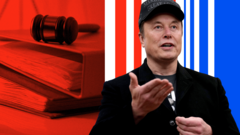Elon Musk is at the helm of a new advisory body aimed at cutting government jobs and spending, invoking both support and criticism amid legal hurdles and allegations of conflicts of interest.
Musk's Bold Moves: The Role of Doge in Restructuring Government Spending

Musk's Bold Moves: The Role of Doge in Restructuring Government Spending
A closer look at Elon Musk's Department of Government Efficiency (Doge) and the implications of job cuts across the federal workforce.
In the latest governmental shakeup, Elon Musk has been appointed to lead a unique initiative named the Department of Government Efficiency (Doge), which is aimed at reducing the federal workforce and eliminating perceived wasteful spending. Created through a presidential executive order by Donald Trump, Doge operates without official government designation and has stirred significant debate regarding its methods and goals.
Musk, who has faced scrutiny from political rivals, asserted that his oversight aims to save taxpayer money and tackle the substantial US national debt, currently standing at $36 trillion. While he initially projected potential savings of up to $2 trillion annually, Musk has moderated expectations since then. The advisory body is reportedly made up of young staff with extensive tech backgrounds, supposedly designed to introduce more efficient practices within government.
Despite Doge's mission to cut what Musk describes as "tyranny of the bureaucracy," critics point out that the group's focus seems to primarily target agencies aligned with opposing political ideologies. Actions taken by Doge have included monitoring spending across various departments and taking aim at reforming the Consumer Financial Protection Bureau (CFPB) and USAID, the latter receiving backlash for allegedly wasteful spending practices.
Public reception of Doge reveals a mixed landscape: while polls suggest broad popular support for government spending cuts, critics voice concerns over the transparency and legitimacy of Musk's approach, especially considering the numerous lawsuits aimed at challenging Doge's activities. The ongoing confrontation between the executive branch and opposition parties highlights the complexity of government reform in the current political climate.
Musk’s involvement as an unpaid special government employee has raised questions regarding conflicts of interest, particularly since his businesses hold extensive contracts with the federal government. While Musk has dismissed accusations of a "hostile takeover" of government functions, the implications of Doge's actions continue to unfold amid protests from unions and various political factions.
As Musk and his team navigate these waters, they face significant hurdles from legal challenges and harsh critiques, leading some analysts to question whether his ambitious goals will ultimately materialize. The conversation surrounding Doge underscores deeper issues regarding government efficiency and the future of federal spending in the United States.
Musk, who has faced scrutiny from political rivals, asserted that his oversight aims to save taxpayer money and tackle the substantial US national debt, currently standing at $36 trillion. While he initially projected potential savings of up to $2 trillion annually, Musk has moderated expectations since then. The advisory body is reportedly made up of young staff with extensive tech backgrounds, supposedly designed to introduce more efficient practices within government.
Despite Doge's mission to cut what Musk describes as "tyranny of the bureaucracy," critics point out that the group's focus seems to primarily target agencies aligned with opposing political ideologies. Actions taken by Doge have included monitoring spending across various departments and taking aim at reforming the Consumer Financial Protection Bureau (CFPB) and USAID, the latter receiving backlash for allegedly wasteful spending practices.
Public reception of Doge reveals a mixed landscape: while polls suggest broad popular support for government spending cuts, critics voice concerns over the transparency and legitimacy of Musk's approach, especially considering the numerous lawsuits aimed at challenging Doge's activities. The ongoing confrontation between the executive branch and opposition parties highlights the complexity of government reform in the current political climate.
Musk’s involvement as an unpaid special government employee has raised questions regarding conflicts of interest, particularly since his businesses hold extensive contracts with the federal government. While Musk has dismissed accusations of a "hostile takeover" of government functions, the implications of Doge's actions continue to unfold amid protests from unions and various political factions.
As Musk and his team navigate these waters, they face significant hurdles from legal challenges and harsh critiques, leading some analysts to question whether his ambitious goals will ultimately materialize. The conversation surrounding Doge underscores deeper issues regarding government efficiency and the future of federal spending in the United States.



















